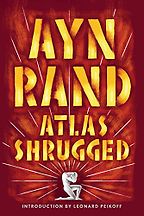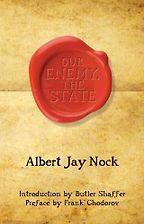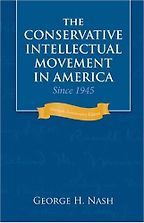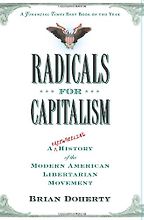Can you define libertarianism?
I will give a quote. This is what H L Mencken said in 1926: ‘It [the State] has taken on a vast mass of new duties and responsibilities; it has spread out its powers until they penetrate to every act of the citizen, however secret; it has begun to throw around its operations the high dignity and impeccability of a State religion; its agents become a separate and superior caste, with authority to bind and loose, and their thumbs in every pot. But it still remains, as it was in the beginning, the common enemy of all well-disposed, industrious and decent men.’
Your first book is Atlas Shrugged by Ayn Rand.
If you read only one book about libertarianism, read this legendary 1957 novel, a 1,100-page deconstruction of the Marxian proposition, ‘From each according to his abilities, to each according to his needs.’ It took her 14 years to write Atlas Shrugged and that wasn’t working on it part-time. That was working very, very hard and at one point she stayed inside her house or on her property in California for a month. She was very intense. This is her magnum opus. Ayn Rand was born Alyssa Rosenburg in St Petersburg, Russia, and was 12 when the Russian Revolution took place and all her family’s property was snatched.
How old was she when she left Russia?
Twenty-one.
So she was properly Russian.
Oh, she was Russian. You should have heard her voice! So, Atlas Shrugged is the mature, the fullest expression of her rejection of any kind of collectivism. It’s probably the only novel of ideas that was written in the form of a detective story. It’s a real page-turner. The heroes of the novel are the entrepreneurs in America in the mid-20th century – the steelmakers, the coal miners, the productive people have all been disappearing from public view and nobody knows where they’ve gone. This happens over the course of ten years, and the heroine, Dagny Taggart, who owns a railroad, which is the controlling metaphor for the novel, tries to find out where they’ve gone, because she’s not able to run her business without all these wonderful suppliers. The ones who are left are all dolts taking government handouts.
“Atlas Shrugged is the mature, the fullest expression of her rejection of any kind of collectivism.”
What she finds out is that a man, the hero, John Galt, who later becomes her lover, has been recruiting the best people everywhere to go on strike. Nothing in the economy can be done without these people, and they stay on strike until the nation comes to its senses and stops becoming a socialist economy. It’s basically about the Roosevelt administration and what it did to the economy. It’s a fantastical rebuttal.
There aren’t many people who would think of America as a socialist society.
Well, she did. And there were lots of people who did in the 30s, 40s, 50s. Before Roosevelt, before the Depression, you can’t imagine how much less government regulation there was in the United States. And that’s the America that Ayn Rand and H L Mencken loved. It’s a whole kind of old-school libertarianism. It’s isolationism, free markets, free minds and not letting the state get too powerful. Individual rather than state power.
It is the only page-turning critique of the welfare state, the bureaucratisation of the ‘altruistic’ impulse, and the transformation of America from a culture of self-reliance to one of self-entitlement by an author whose four mid-century novels (with The Fountainhead, Anthem and We the Living) sold one million copies in 2009.
On Liberty by John Stuart Mill.
Mill’s famous essay is an illuminating reading experience, even if you read it in college. Its thesis is to define ‘the nature and limits of the power which can be legitimately exercised by society over the individual’. Its conclusion is that ‘the sole principle for which mankind are [sic] warranted, individually or collectively, in interfering with the liberty of any of their number is self-protection’. He goes on to say that the parental social order has no moral basis for coercing us to do anything against our will – even for our own good, let alone the good of others! He was a utilitarian rather than a libertarian proponent of natural rights, which disqualified him as a lover of liberty for Rand, but file that away and read on, unperturbed.
What’s the difference?
Utilitarian political philosophy is based on the greatest good for the greatest number. Libertarian political philosophy is individual rights. This essay is about why society and the government will take over more and more of our lives and tell us what to do if we don’t resist. It’s the natural way of things.
Can people resist?
No, we can’t resist. The price of liberty is vigilance and we aren’t very vigilant people. Imagine how John Stuart Mill would feel if he were made to wear a seatbelt because the federal government tells him so. His idea is that there is no reason for society or the government to infringe on individual decision-making except for self-protection and the protection of others. We ought to defend our individual liberties. He even saw in Britain in his time a tendency for the government and society to accumulate power – what libertarians have been worrying about ever since.
But aren’t human beings social animals? Aren’t we like ants in an anthill?
Some are but some, like Isaac Newton, prefer never to see another human being as long as he lived. He worked in solitude and yet produced some of the greatest benefits of mankind. So, no. Some are and some of us are not.
Our Enemy the State by Albert Jay Nock.
Published in 1935, two years into the New Deal’s experiment in social engineering, this wry classic on the intensifying nature of incursions by state power into private economic spheres is a classic of libertarianism. Here Nock made his famous distinction between economic man – he who actually produces wealth by producing, manufacturing and trading – and political man – he who doesn’t produce anything and appropriates wealth produced by others and uses it to accomplish his own aims.
“Before Roosevelt, before the Depression, you can’t imagine how much less government regulation there was in the United States.”
Nock, a friend of H L Mencken, is also the author of an idiosyncratic libertarian autobiography called Memoirs of a Superfluous Man. Both books are available free online from blog.mises.org.
Is it readable?
Yes! This is a book for the general reader. It concentrates on the economy and how the government is involved in managing the economy. His belief is that anybody who gets in between the furniture maker and his customer is in the middle only because he wants to get some money out of it. That’s the way he views government interference in a free economy. He’s a beautiful writer. He was a self-educated man, but extremely well-educated and his memoirs are about how a certain type of education is no longer very useful in America.
These people are all curmudgeons but amusing and instructive ones. You may not agree with everything they have to say, but they provide a useful counterweight to our expanding government. And we have such a huge government in America today. I don’t know how much of the economy it consumes but it’s got its fingers everywhere in our lives, so it’s a good idea for us to read some of these old-fashioned individual rights people.
Isn’t education a good example of where the state needs to step in? Education and healthcare?
Well, it depends on your perspective. From my perspective some things have become so large and unwieldy that they need some kind of central planning, but libertarians certainly wouldn’t feel that way. They insist, and in fact I’ve been having this debate on my blog, that the free market will take care of everything, including education. My argument is that we can’t afford not to educate people in a democracy because they won’t learn how to become good leaders for one thing. And so you can’t just let it go to chance which, it seems to me, is what libertarians would do. And as to healthcare, well, I’m conflicted about that. This government screws up everything it does. I know Britain created a good system but I’m not at all sure that we can or will. We seem unable to do it the simple way, by extending Medicare for example. That would be good. But too many interests get in the way.
The Conservative Intellectual Movement in America, since 1945, by George N Nash. It sounds heavy.
It is heavy. But it’s easily read. If you want to know about the development of the ideas of libertarianism and Christian conservatism, it’s the best book you could read. Libertarians and Christian conservatives split off after the war. There was no such thing as Christian conservatism before the war – nobody based their principles on how to govern on Christian values.
It is perhaps the most comprehensive and surely the most readable book on the rise of post-war Christian conservatism, à la William F Buckley Jr, and of its unruly, agnostic, and finally disowned older brother, libertarianism. While the Buckleyites cheered the Cold War (and most succeeding wars) and became increasingly militaristic, the libertarians continued to call for small government and a balanced budget. Soon the conservatives squeezed out the libertarians, who finally burst forth again in last year’s Tea Parties. Nash’s book was first published in 1996, but his insights and their cultural context are more pertinent than ever.
Get the weekly Five Books newsletter
I’m interested that libertarianism is an openly right-wing phenomenon. The word doesn’t sound like that.
There have been attempts, especially in the 1960s, because libertarians are anti-war, to get together with the New Left, but it didn’t work very well because that was pretty much all they shared. The libertarians just don’t think government should take care of people.
Like anarchy?
Well, that is no government at all. These people want a little tiny government that will defend us against our enemies and police crime in the nation and they want courts that will adjudicate contracts. They think everything should be done by contract.
Radicals for Capitalism: A Freewheeling History of the Modern American Libertarian Movement by Brian Doherty.
This is Reason magazine senior editor Dougherty’s splendidly researched 2007 survey of libertarian thinkers and activists, from Ayn Rand to Murray Rothbard and beyond, and it is full of colourful stories about the once well-known figures who settled the frontier of American radical individualism and free-market theory. Dougherty is especially good at explaining complex ideas in simple language while never taking his eye off the typically eccentric personalities that made it so.
I love the flavour it gives you of the time. In the late 40s/early 50s some of these right-wingers, like William Mullindore, who was vice-president of Edison in Southern California, and Leonard Read, all these businessmen types went off to Bretton Woods and all took acid together. This was the very beginning of acid. Mullindore said it really plugs you in and gives you voltage for thinking. He used electric company metaphors to describe his experience. Hilarious.
Five Books aims to keep its book recommendations and interviews up to date. If you are the interviewee and would like to update your choice of books (or even just what you say about them) please email us at [email protected]
Five Books interviews are expensive to produce. If you've enjoyed this interview, please support us by donating a small amount.










